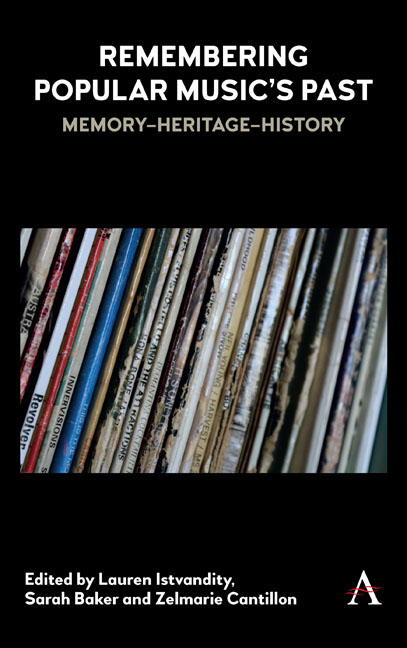Book contents
- Frontmatter
- Contents
- List of Figures
- Acknowledgements
- Chapter 1 The Precarity of Memory, Heritage and History in Remembering Popular Music's Past
- Part I MEMORY
- Chapter 2 Consuming Popular Music Heritage
- Chapter 3 ‘Back in the Day’: Experiencing and Retelling the Past as a Claim to Belong in the Current Northern Soul Scene
- Chapter 4 Resilience and Change: Popular Folk Songs in a Cultural Landscape
- Chapter 5 Remembering the Independent Record Shop: The Ordinary Affects of Leedin Records
- Chapter 6 Mean Streets as Heritage Object: Music, Nostalgia and the Museumification of Martin Scorsese
- Part II HERITAGE
- Part III HISTORY
- List of Contributors
- Index
Chapter 6 - Mean Streets as Heritage Object: Music, Nostalgia and the Museumification of Martin Scorsese
from Part I - MEMORY
Published online by Cambridge University Press: 09 July 2019
- Frontmatter
- Contents
- List of Figures
- Acknowledgements
- Chapter 1 The Precarity of Memory, Heritage and History in Remembering Popular Music's Past
- Part I MEMORY
- Chapter 2 Consuming Popular Music Heritage
- Chapter 3 ‘Back in the Day’: Experiencing and Retelling the Past as a Claim to Belong in the Current Northern Soul Scene
- Chapter 4 Resilience and Change: Popular Folk Songs in a Cultural Landscape
- Chapter 5 Remembering the Independent Record Shop: The Ordinary Affects of Leedin Records
- Chapter 6 Mean Streets as Heritage Object: Music, Nostalgia and the Museumification of Martin Scorsese
- Part II HERITAGE
- Part III HISTORY
- List of Contributors
- Index
Summary
The SCORSESE exhibition at the Australian Centre for the Moving Image in Melbourne (May–September 2016) combined film excerpts and film-related artefacts with pieces of personal memorabilia drawn from the collections of director Martin Scorsese and his frequent collaborator Robert de Niro. Conceived and organized by the Deutsche Kinemathek Museum für Film und Fernsehen in Berlin, Germany, in collaboration with EYE Filmmuseum, Amsterdam, the design of the exhibition was deliberately non-linear and nonchronological, organized instead by themes (such as Family and New York) and film-making categories (such as Cinematography and Editing), which blurred the lines between Scorsese's life, cinephilia and cinematic productions. One of its categories was Music. A featured object in this part of the exhibition was a box of 45s from his childhood home. In the audio guide for the exhibit, Scorsese discusses the record collection and memories from his youth combined with his recollection of the role played by these records in his films:
The key was then collecting the 45s. Eventually, because we were only in three rooms, they had to be placed somewhere, and I got this box. This is the first box that I kept my 45s in. And I had to find an index –I had to make an index –so I typed it up myself. […] The Aquatones, You, was one of my favorites. We used that in Mean Streets. Desiree by the Charts was my favorite of that type of doo wop. And it's the blending here of popular music –Johnny Mathis –with the influx of rock n roll –of course, Fats Domino. And then country and western rock ‘n’ roll like the Everly Brothers and Dale Hawkins. […] Mean Streets –pretty much all the tracks come from this box –or maybe another box there [at home], too –somewhere –but I must say, the actual 45s we used with scratches and all. This music for me was how I saw the world. I mean looking out from my window. Or I'd be walking in the street and something would be playing and it was usually in counterpoint to what was going on in this spectacle on the street. (Scorsese 2016)
- Type
- Chapter
- Information
- Remembering Popular Music's PastMemory-Heritage-History, pp. 69 - 82Publisher: Anthem PressPrint publication year: 2019



